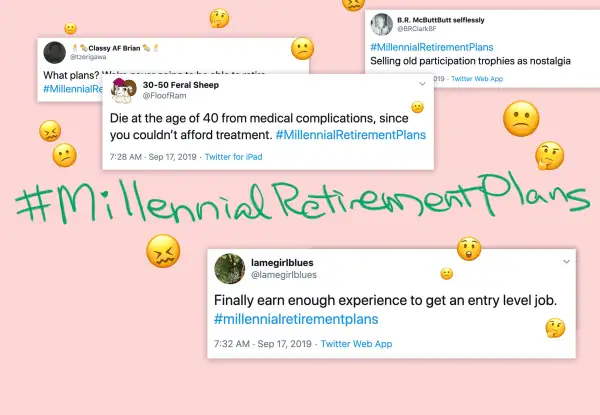#MillennialRetirementPlans Is the Saddest, Truest Hashtag on the Internet Right Now

You know what they say: If sky-rocketing college tuition, housing prices, and healthcare costs combined with stagnant wages makes you feel completely helpless about your financial future, the best thing to do is tweet about it.
Ok, ok … so obviously no one says that.
But thousands of millennials on the internet are leaning into the whole, I’d-rather-laugh-than-cry-strategy with #millennialretirementplans, a hashtag that zeroes in on the systemic financial challenges their generation faces.
Millennials tend to have more debt than prior generations, thanks in large part to the increasing need to rely on student debt to attend college. Wages have been largely stagnant over the past few decades, as prices for necessities such as healthcare have climbed.
As a result, millennials have a lower net worth — less than $8,000 — than previous generations at their age, according to a Deloitte study reported in the Washingon Post. The cherry on the top? Several signs are pointing toward of an impending economic recession.
So perhaps it's no surprise that #millenialretirementplans is trending now, and that it has nothing to do with 401(k) plans or target-date funds.
Here are some of our favorite dark takes from Twitter on how millennials will retire.
Apocalypse jokes aside, there is research that suggests many millennials are actually taking saving seriously — even if they face economic and workplace challenges their parents and grandparents didn't. A recent TransAmerica study, for example, found millennials start saving for retirement at age 24, compared to 30 for Gen X and 35 for Baby Boomers.
While we're laughing (and crying) at #millennialretirementplans like the rest of the internet, you may want to use the trending hashtag as motivation to put yourself in a better financial situation. Consider opening a Roth 401(k), an under-used account that's especially attractive for workers under 30.
Your goal? Work your way up to saving between 12% and 15% of your salary, so that #millennialretirementplans won't just be a cruel joke.
